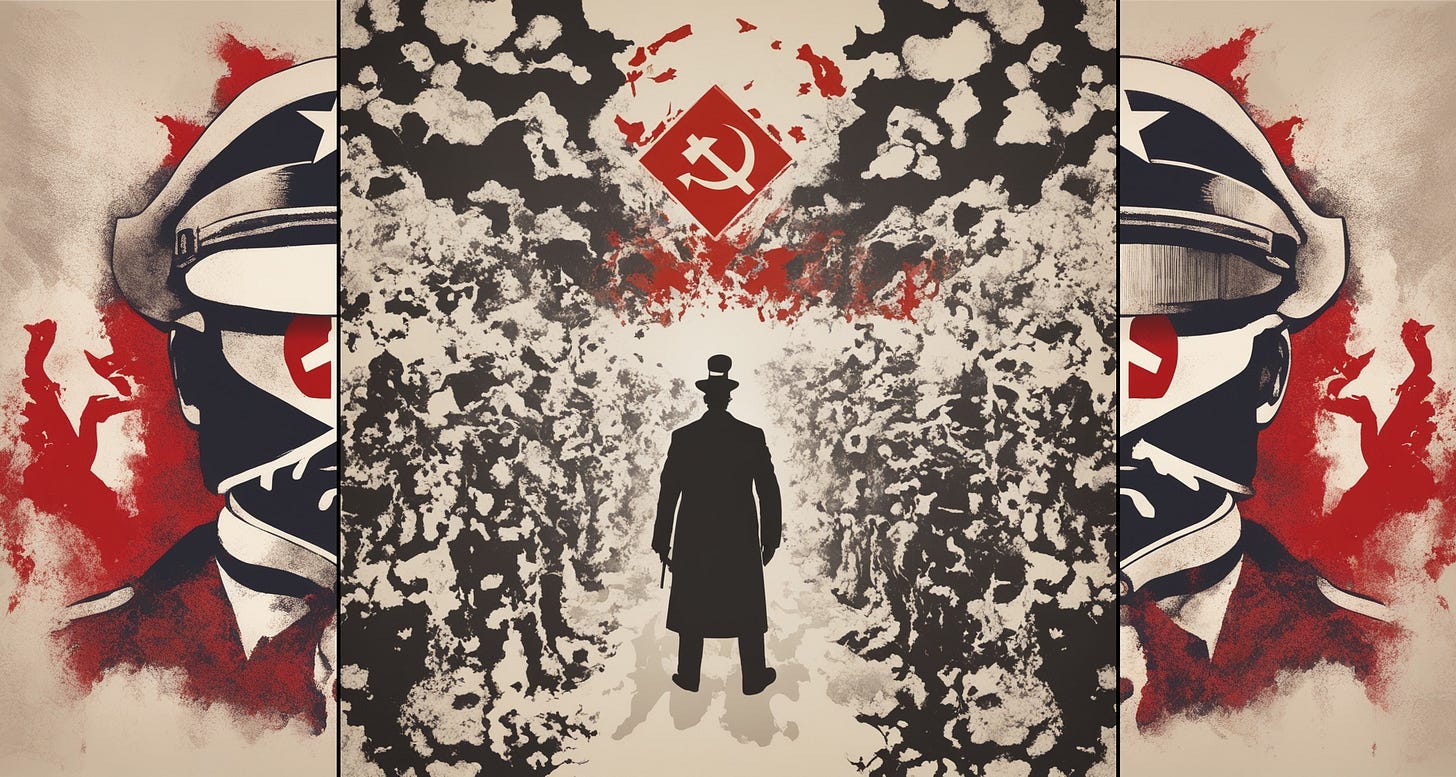The Tower of Socialism Babel
"Socialism" has become a political vessel into which both the left and right project their hopes or fears, but it's time we started speaking the same language.
Jamie Paul here. This post is by Contributor Johan Pregmo, but I also wanted to share a recent article I wrote which was translated into Portuguese and republished in Gazeta do Povo: “Brazil is wrong in wanting to arrest and censor homophobes.”
The socialist economist Richard Wolff was being tongue-in-cheek when he said, “Socialism is when the government does stuff,” but he was also tapping into a very real sentiment. We’ve all heard American progressives say something to the effect of “If only we could have socialism like they do in Europe, we’d be doing much better.” Likewise, it’s common to hear conservatives refer to any regulation, tax, or government program they disagree with as “SOCIALISM!”, with the built-in assumption that this is tyrannical, evil, and bad.
On both the left and the right, there exists this strange, simplistic perception that socialism is simply a matter of how much power the executive body wields. For many progressives who say they want “socialism”, they mean more social spending in areas such as healthcare, education, and social security. “Socialism”, in their minds, is when the government takes an active role in improving the lives of its citizens. Similarly on the right, many hold the pernicious notion that socialism is when the government does anything at all. The mere existence of government authority is enough to make conservatives conjure the sinister specters of Chairman Mao and Comrade Stalin.
Of course, these misconceptions are nothing new. Harry S. Truman said in 1952 that socialism was “a scare word [Republicans] have hurled at every advance the people have made in the last 20 years.” Indeed, Truman’s predecessor, Franklin D. Roosevelt, was tarred as a socialist decades before Soviet-era McCarthyism. Americans have a long history of misdefining socialism, but the ignorance has deepened in recent years. The Cold War is over, and its post-victory afterglow has long since faded. We no longer have the USSR to point to as an easy example of socialism, and most young people have virtually no living memory of socialism in practice. Today, even “communist China” has adopted many elements of capitalism. Populists on both sides of the aisle have ushered in a new era of politics shaped, in part, by their mutual misunderstanding of what socialism actually is.
This leads to a Babel-like political landscape where no one comprehends one another. If one person argues in favor of socialism simply meaning “we should increase healthcare spending for the needy”, and the person on the other side hears “we should have a 1984-style dictatorship with collectivized industry and executions for anyone who disagrees”, they’re not just talking past each other — both sides will think the other is downright evil for rejecting their ideas. If we want economic and political discourse to be productive at all, we need a shared understanding of socialism.
Like many political terms, such as “liberalism” or “fascism”, “socialism” can have as many meanings as there are people with opinions about it. Depending on who you ask, socialism could mean utopia, or absolute tyranny, or “when the government does stuff”, or economic justice, or a democratized workplace. This isn’t made any easier by the divided nature of the far left, where factions endlessly splinter and declare their niche to be the only True Socialism™ while all others are imposters. So which definition is correct? To answer that, let’s first have a brief look at the history of the concept.
Socialism originally sprung up as an offshoot from the French Revolution. While the liberal values of the Revolution addressed political rights, the 1800s that followed were marked by stark social and economical divides and soaring inequality — to which socialism arose in response. In 1848, Marx and Engels published the Communist Manifesto, giving socialism the modern, anti-capitalist framework we associate it with today — a worldview defined by ongoing class struggle progressing toward a society where we need neither government nor profit. Socialism, in Marx’s mind, was the transitional stage in between capitalism and his communist utopia, a state wherein the working classes seize the means of production and govern themselves.
That’s the theory. In practice, socialism at scale also invariably entails a dictatorship controlled by a small elite of party officials, thus negating the theoretical vision of a perfectly equal society. Only total control can implement and enforce the kinds of radical central planning that socialist governments have attempted. So what exactly is socialism? Considering it both in theory and practice, socialism can be adequately defined as “A society in which a left-wing government has taken full control of all industries.”
Neither socialism’s theory nor practice, however, is reflected in what the left or right popularly envision it to be. Socialism is a very specific political and economic ideology. To use the term as a cudgel or vague rallying cry undermines public understanding of what it means. Socialism, according to Marx, would not be the mere existence of a large government or a welfare state, but a natural societal progression, like that of feudalism transitioning into capitalism. And yet, either out of ignorance or cynicism, people across the political spectrum who have never cracked a page of political theory pronounce upon socialism with an air of authority.
Many on the American left err when they conflate social democracy and socialism as one and the same. They falsely believe that Europe is significantly to the left of the US, and that the high tax rates and welfare spending of a progressive country like Sweden makes it socialist. In this conception, high levels of welfare spending and progressive social attitudes somehow equates to socialism. This is ahistorical and simply mistaken.
Aside from Europe being far from the socially progressive utopia imagined by the American left (especially in the notoriously traditionalist East, or the often bloody Balkans), the idea of welfare spending predates the existence of socialism by thousands of years. From the Roman grain dole to the famously conservative Otto von Bismarck to the US founding fathers, the idea that the government ought to do something about social inequality is hardly new. Socialism may be revolutionary in nature, but the issues it tackles are as old as civilization itself.
When a progressive talks about wanting “European-style socialism”, what he really means (unless he’s operating under the misapprehension that Europe’s governments are brimming with actual Marxism) is “liberal capitalism with more government spending for the socially disadvantaged.” In reality, for all their welfare spending, the Nordic countries simply aren’t socialist in any meaningful sense of the term. Europe embraced reform, not revolution, to resolve the social tensions of the lower classes — and one need only take a look at the USSR’s humanitarian record and disastrous economic policy to know that’s a good thing.
The American right wing, meanwhile, speaks of socialism as being synonymous with any form of government control, which they resist at every stage. Unless, of course, the enormous powers of government are used by a Republican president, or used to suppress something they don’t like. When it comes to banning books from school libraries for offending Christian sensibilities, or exerting control over social media companies, or prohibiting topics from curricula — then suddenly the firm hand of the state becomes appealing.
This approach serves a singular, often cynical purpose: to imply that government tyranny could only come from the left, and that the political right is somehow immune to the trappings of despotism. This conflation of socialism with authoritarianism is contradicted by all of history. Autocracy and dictatorial rule has been the norm from the dawn of human civilization, and any king or emperor worth his salt always tried to concentrate power as much as possible. Was Emperor Trajan a socialist? Or Frederick the Great of Prussia? Or Louis XIV, the very picture of conservative, appointed-by-God royal absolutism? Were Tsar Peter the Great or Napoleon socialists? These men were all autocrats who wielded absolute, unchecked power. What they have in common with the likes of Stalin and Mao is only that — autocracy. None of these monarchs, for example, had such disastrous ideological policy failures that directly led to the devastating famines suffered by the people of the USSR or China. When folks on the right slander all liberal reforms, however moderate, as socialist, and when leftists claim that the Soviet Union, or North Korea, or the innumerable other failed socialist states weren’t/aren’t “real” socialism, they are expressing the same conceit. Both avoid confronting the fact that authoritarianism is a universal human tendency with no genuine ideological home.
There is no doubt the characterization of “socialism as government” is, in part, deliberate and strategic. The legacy of McCarthyism remains a potent tool in Republican circles, and still plays well with the rural base and among conservative immigrants from South America fleeing socialist hellholes. Likewise, the allure of Europe as a so-called model of socialism to emulate only grows more entrenched on the left.
Understanding the meaning of socialism is about more than simply improving political discourse. It is necessary for comprehending what government is in a liberal democracy. Voters who erroneously come to think that government intervention is inherently evil or an absolute necessity for progress tend to have completely unrealistic expectations of what government is or how government works. This, in turn, incentivizes politicians to win votes with outlandish campaign promises that they can never deliver on, whether it’s gutting the federal government to thwart “socialism” and safeguard “freedom”, or with proposals of extravagantly generous social programs whose economics don’t quite add up (“European-style socialism”).
It may be too idealistic to expect political concepts and terminology to never be abused into catch-all meaninglessness. But unchecked, it leads to a breakdown of discourse, extreme hostility, and political dysfunction. In such a divisive landscape, understanding one another is more important than ever. Part of the solution is something we can all contribute to. When the word “socialism” comes up in conversation, ask what the other person means by it. We may be surprised by their thinking — and they may be surprised to learn that socialism is not what they thought it was. It won’t magically make us agree on everything, but it will at least ensure that we’re talking to each other, not past each other.
See also: “Okay, We’ve Dismantled the State. Now What?”
Subscribe now and never miss a new post. You can also support the work on Patreon. Please consider sharing this article on your social networks, and hit the like button so more people can discover it. You can reach me at @AmericnDreaming on Twitter, or at AmericanDreaming08@Gmail.com.







Super informative! Now I have solid talking points, so thank you for this
There's for sure a market freedom spectrum that goes from full blown centrally planned economy, to Lenin's NEP, to heavy price controls, to China-like mixed economy, to limited price controls, to Eastern European mixed economies, to Northern European welfare states and so forth. The cutoff for what people consider socialism in the spectrum varies. Marxism, however, is not just an economic ideology, it's a prophetic religion.